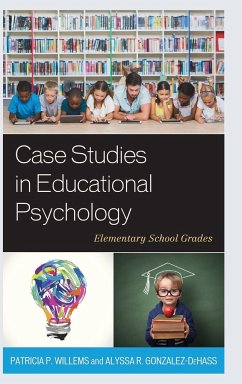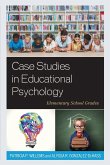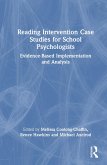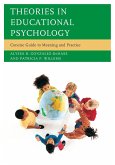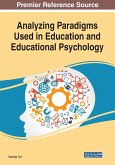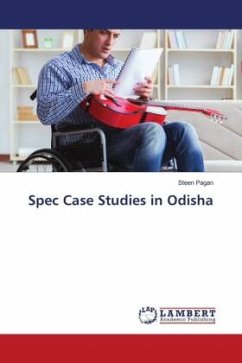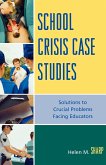Patricia P. Willems, Alyssa R. Gonzalez-Dehass
Case Studies in Educational Psychology
Elementary School Grades
Patricia P. Willems, Alyssa R. Gonzalez-Dehass
Case Studies in Educational Psychology
Elementary School Grades
- Gebundenes Buch
- Merkliste
- Auf die Merkliste
- Bewerten Bewerten
- Teilen
- Produkt teilen
- Produkterinnerung
- Produkterinnerung
This case study book represents current areas of interest in Educational Psychology embedded within current challenges teachers face in today's elementary grade classrooms.
Andere Kunden interessierten sich auch für
![Case Studies in Educational Psychology Case Studies in Educational Psychology]() Patricia P. WillemsCase Studies in Educational Psychology48,99 €
Patricia P. WillemsCase Studies in Educational Psychology48,99 €![Reading Intervention Case Studies for School Psychologists Reading Intervention Case Studies for School Psychologists]() Reading Intervention Case Studies for School Psychologists199,99 €
Reading Intervention Case Studies for School Psychologists199,99 €![Theories in Educational Psychology Theories in Educational Psychology]() Alyssa R. Gonzalez-DehassTheories in Educational Psychology93,99 €
Alyssa R. Gonzalez-DehassTheories in Educational Psychology93,99 €![Case Studies by Kmc Class of '64 Case Studies by Kmc Class of '64]() MD Faapmr Kanakadurga R. PoduriCase Studies by Kmc Class of '6420,99 €
MD Faapmr Kanakadurga R. PoduriCase Studies by Kmc Class of '6420,99 €![Analyzing Paradigms Used in Education and Educational Psychology Analyzing Paradigms Used in Education and Educational Psychology]() Analyzing Paradigms Used in Education and Educational Psychology172,99 €
Analyzing Paradigms Used in Education and Educational Psychology172,99 €![Spec Case Studies in Odisha Spec Case Studies in Odisha]() Steen PaganSpec Case Studies in Odisha41,99 €
Steen PaganSpec Case Studies in Odisha41,99 €![School Crisis Case Studies School Crisis Case Studies]() Helen M. SharpSchool Crisis Case Studies43,99 €
Helen M. SharpSchool Crisis Case Studies43,99 €-
-
-
This case study book represents current areas of interest in Educational Psychology embedded within current challenges teachers face in today's elementary grade classrooms.
Hinweis: Dieser Artikel kann nur an eine deutsche Lieferadresse ausgeliefert werden.
Hinweis: Dieser Artikel kann nur an eine deutsche Lieferadresse ausgeliefert werden.
Produktdetails
- Produktdetails
- Verlag: Rowman & Littlefield Publishers
- Seitenzahl: 184
- Erscheinungstermin: 6. Dezember 2017
- Englisch
- Abmessung: 235mm x 157mm x 15mm
- Gewicht: 426g
- ISBN-13: 9781475839142
- ISBN-10: 1475839146
- Artikelnr.: 48698162
- Herstellerkennzeichnung
- Libri GmbH
- Europaallee 1
- 36244 Bad Hersfeld
- gpsr@libri.de
- Verlag: Rowman & Littlefield Publishers
- Seitenzahl: 184
- Erscheinungstermin: 6. Dezember 2017
- Englisch
- Abmessung: 235mm x 157mm x 15mm
- Gewicht: 426g
- ISBN-13: 9781475839142
- ISBN-10: 1475839146
- Artikelnr.: 48698162
- Herstellerkennzeichnung
- Libri GmbH
- Europaallee 1
- 36244 Bad Hersfeld
- gpsr@libri.de
Patricia P. Willems is an associate professor of educational psychology at Florida Atlantic University, where she currently teaches both undergraduate and graduate courses in educational psychology. She earned her PhD in educational psychology from the University of Florida and her publications are in the areas of case study instruction, learning environments, motivation, school-community partnerships, and parent involvement. Alyssa R. Gonzalez-DeHass received her Ph.D. in Educational Psychology from the University of Florida in 1998, she has been publishing in the area of student motivation since receiving her doctorate. Her research interests lie in the areas of students' achievement goals, parent involvement, school-community partnerships, and the case study method to teaching educational psychology.
Part I: Human Development Case 1: Adolescent Cliques: To Belong or Not to
Belong? Case 2: Internet Plagiarism Case 3: Academic Honesty Case 4:
Cyberbullying and Adolescent Identity Part II: Individual Differences and
Diversity Case 5 : Gender Equity: Encouraging Female Students in Science
Case 6: Teaching Students with Special Learning Challenges Part III:
Learning Theories Case 7: Cell Phones in Class: Problems with Texting Case
8: Adolescent Relationships and the Power of Social Media Case 9: Grade
Grubbing: Complaining and Arguing About Grades Part IV: Motivation Case 10:
Encouraging Girls Confidence in Math Case 11: Stressed Out: Dealing with
Academic Pressure in High School Part V: Classroom Management Case 12: The
Role of the Teacher: Can Students and Teachers Be Friends? Case 13:
Responding to Students' Backtalk and Disrespect Case 14: Encounters with
Difficult Parents Part VI: Instructional Approaches Case 15: Making the
Most of Academic Learning Time Case 16: Meaningful Authentic Learning:
Finding the Funding Part VII: Assessment and Evaluation Case 17: Meaningful
and Fair: Grading Subjective Assessments
Belong? Case 2: Internet Plagiarism Case 3: Academic Honesty Case 4:
Cyberbullying and Adolescent Identity Part II: Individual Differences and
Diversity Case 5 : Gender Equity: Encouraging Female Students in Science
Case 6: Teaching Students with Special Learning Challenges Part III:
Learning Theories Case 7: Cell Phones in Class: Problems with Texting Case
8: Adolescent Relationships and the Power of Social Media Case 9: Grade
Grubbing: Complaining and Arguing About Grades Part IV: Motivation Case 10:
Encouraging Girls Confidence in Math Case 11: Stressed Out: Dealing with
Academic Pressure in High School Part V: Classroom Management Case 12: The
Role of the Teacher: Can Students and Teachers Be Friends? Case 13:
Responding to Students' Backtalk and Disrespect Case 14: Encounters with
Difficult Parents Part VI: Instructional Approaches Case 15: Making the
Most of Academic Learning Time Case 16: Meaningful Authentic Learning:
Finding the Funding Part VII: Assessment and Evaluation Case 17: Meaningful
and Fair: Grading Subjective Assessments
Part I: Human Development Case 1: Adolescent Cliques: To Belong or Not to
Belong? Case 2: Internet Plagiarism Case 3: Academic Honesty Case 4:
Cyberbullying and Adolescent Identity Part II: Individual Differences and
Diversity Case 5 : Gender Equity: Encouraging Female Students in Science
Case 6: Teaching Students with Special Learning Challenges Part III:
Learning Theories Case 7: Cell Phones in Class: Problems with Texting Case
8: Adolescent Relationships and the Power of Social Media Case 9: Grade
Grubbing: Complaining and Arguing About Grades Part IV: Motivation Case 10:
Encouraging Girls Confidence in Math Case 11: Stressed Out: Dealing with
Academic Pressure in High School Part V: Classroom Management Case 12: The
Role of the Teacher: Can Students and Teachers Be Friends? Case 13:
Responding to Students' Backtalk and Disrespect Case 14: Encounters with
Difficult Parents Part VI: Instructional Approaches Case 15: Making the
Most of Academic Learning Time Case 16: Meaningful Authentic Learning:
Finding the Funding Part VII: Assessment and Evaluation Case 17: Meaningful
and Fair: Grading Subjective Assessments
Belong? Case 2: Internet Plagiarism Case 3: Academic Honesty Case 4:
Cyberbullying and Adolescent Identity Part II: Individual Differences and
Diversity Case 5 : Gender Equity: Encouraging Female Students in Science
Case 6: Teaching Students with Special Learning Challenges Part III:
Learning Theories Case 7: Cell Phones in Class: Problems with Texting Case
8: Adolescent Relationships and the Power of Social Media Case 9: Grade
Grubbing: Complaining and Arguing About Grades Part IV: Motivation Case 10:
Encouraging Girls Confidence in Math Case 11: Stressed Out: Dealing with
Academic Pressure in High School Part V: Classroom Management Case 12: The
Role of the Teacher: Can Students and Teachers Be Friends? Case 13:
Responding to Students' Backtalk and Disrespect Case 14: Encounters with
Difficult Parents Part VI: Instructional Approaches Case 15: Making the
Most of Academic Learning Time Case 16: Meaningful Authentic Learning:
Finding the Funding Part VII: Assessment and Evaluation Case 17: Meaningful
and Fair: Grading Subjective Assessments

